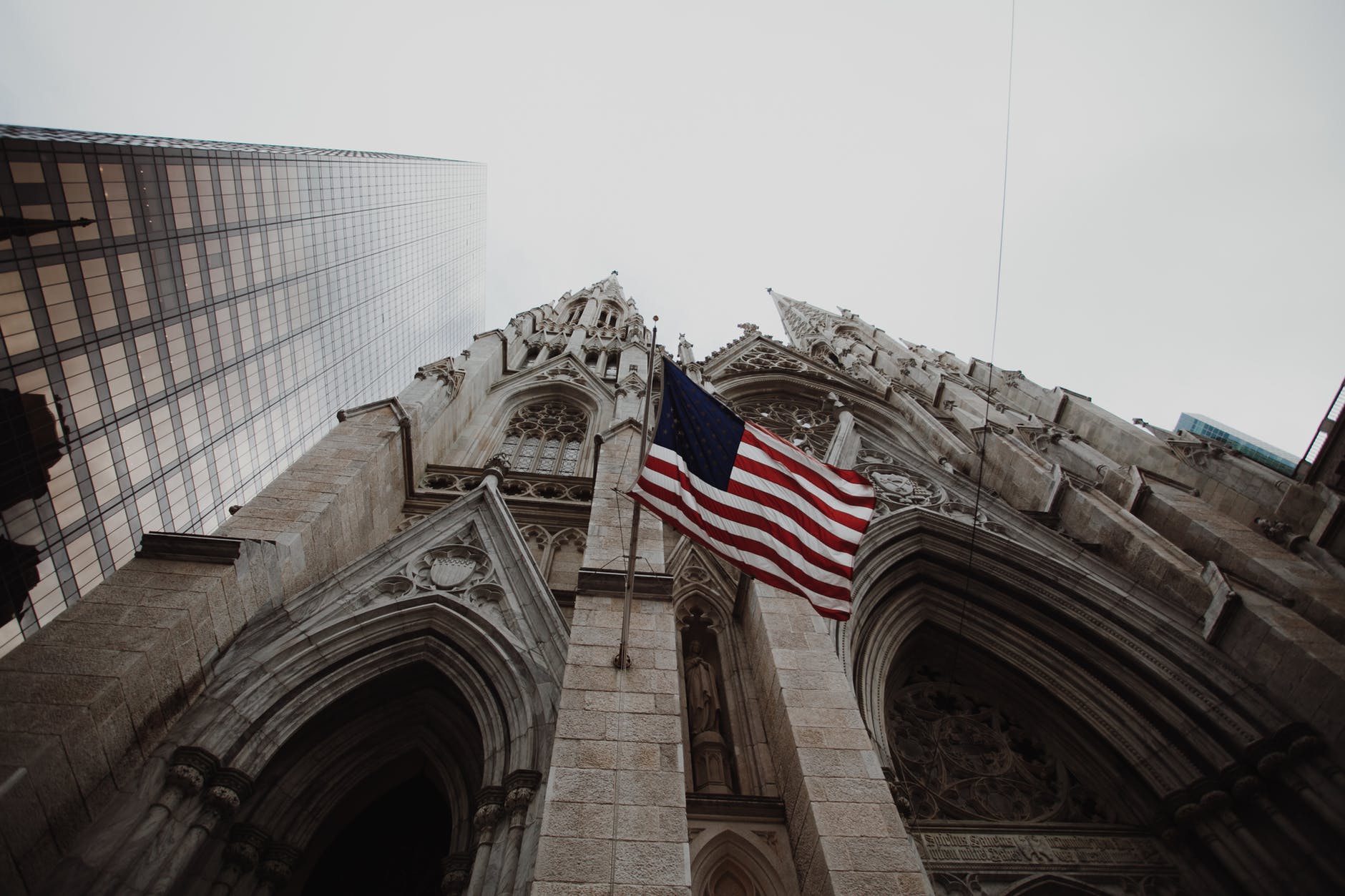Law, Gospel, and the Purple Church

Co-missioners,
We hear from Paul Theiss this week on a topic as timely as timely gets. It begs for a lot of discussion—much more than it’s getting, as Paul points out. If you have reason to launch the conversation in your churchly setting, we recommend Paul’s essay as a solid starting point.
Peace and Joy,
The Crossings Community
Law, Gospel, and the Purple Church: Finding Unity and Keeping Things Real through Law and Gospel
by Paul G. Theiss
I’m a retired pastor without regular Sunday responsibilities. Mostly I worship virtually at home from my La-Z-Boy. Church in the pandemic has a pleasant side for this parishioner in PJs. But spiritually it’s been tough. I miss the group singing and the warmth of koinonia. Even more difficult, my mid-sized suburban congregation has trouble keeping it real. We spend a lot of energy treading carefully around anything that might be controversial, settling for a bland diet that doesn’t speak to the challenges we’re facing. You see, we’re a purple church, neither red nor blue but some of each. Factionalism threatens to weaken us, but the nourishment of Law and Gospel could strengthen and unify us in Christ.
I’m proud of my congregation. My pastor works hard to share her exuberant faith. We have a dynamic youth ministry led by a talented young Latina. Our exceptional preschool has served generations of families. The food pantry feeds hundreds a week. Civic leaders from our church work on the local housing crisis.
![]() But we’re a purple church, a mixed bag of blue and red, getting our news from Fox or Rachel Maddow. The Council wrangled over mask mandates. One member, outraged by family separations at the border, shared a call to stay away from church unless the pastor’s next sermon addressed the issue. Other worshipers wear an American flag pin with the cross superimposed, showing their faith in God and Country. Some questioned whether the Coronavirus was real or “fake news.”
But we’re a purple church, a mixed bag of blue and red, getting our news from Fox or Rachel Maddow. The Council wrangled over mask mandates. One member, outraged by family separations at the border, shared a call to stay away from church unless the pastor’s next sermon addressed the issue. Other worshipers wear an American flag pin with the cross superimposed, showing their faith in God and Country. Some questioned whether the Coronavirus was real or “fake news.”
Being a purple church is something to be thankful for these days. Our society has fewer and fewer places where people cross party lines to come together for a cause. But what is that cause? What brings us together? Is it Christ, or warmed-over gemütlichkeit from a bygone era? If it’s the latter, how long will the connections hold under the stress of polarization?
During months of crisis our congregation drifted in an unreal world of God-talk, avoiding issues that might divide us. Bible studies stuck to the minutiae of text. Sermons were abstract and generalized. We groped for the lowest common denominator. We tried to be “all things to all people,” but I wonder if we ministered to none.
As a member in lockdown I look for encouragement, a spiritual lifeline from my congregation, but I rarely find one. This Sunday I could be worshiping in person, but as an immune-compromised person I will shelter at home. I feel unsafe in a room where people choose not to wear a mask. It’s an alienating experience.
I believe that Law and Gospel can strengthen a divided congregation without driving people apart, because I’ve seen it happen. Once I pastored a small-town church which was polarized over a contentious local recall election. There were tears at the coffee hour, and friendships were strained. Members staffed dueling literature tables outside the post office. I wondered what, if anything, to say. The division was too hurtful to ignore. So I decided to preach on the Eighth Commandment (Luther’s numbering), and quoted his explanation: “We are to fear and love God, so that we do not tell lies about our neighbors, betray or slander them, or destroy their reputations. Instead we are to come to their defense, speak well of them, and interpret everything they do in the best possible light.”
because I’ve seen it happen. Once I pastored a small-town church which was polarized over a contentious local recall election. There were tears at the coffee hour, and friendships were strained. Members staffed dueling literature tables outside the post office. I wondered what, if anything, to say. The division was too hurtful to ignore. So I decided to preach on the Eighth Commandment (Luther’s numbering), and quoted his explanation: “We are to fear and love God, so that we do not tell lies about our neighbors, betray or slander them, or destroy their reputations. Instead we are to come to their defense, speak well of them, and interpret everything they do in the best possible light.”
Dead silence fell on the congregation. The weight of the Law pressed upon them. Suddenly they were unified, but not by choice. Next came an uplifting and healing Gospel that we all could share, and share alike. Law and Gospel, working together, had accomplished a miracle. After the service I waited for their reaction. One of the older gents, a pillar of the congregation, shook my hand and said ironically, with a twinkle in his eye, “Pastor, how come you preached to us and not to the other side?” His dry humor told me that the message had gotten through. By God’s grace we came together again as forgiven sinners, stronger than before.
A purple church finds unity under the Law as well as under the Gospel. When the Law is applied to everyone, all can understand that our righteousness comes from God, not the correctness of our convictions or our outward civility. When we see ourselves falling short, we can be more patient with people who don’t agree with us. We can decide to listen to them and try to understand their point of view. When church people feel they can safely tell their stories, their church can be a refuge in troubled times.
This gift is desperately needed in a divided society. People seem to be searching for it. The hit  song, “We Don’t Talk about Bruno,” [1] from the Disney movie Encanto is a cry for help hidden within a riveting Latin ballad. “Bruno” has rocketed up the Billboard and Spotify charts, the first Disney song to do so since “Let It Go” from Frozen eight years ago. “Let It Go” celebrates individualism at any cost. “Bruno” is a song about family members conspiring to repress things about themselves that they are afraid to face. Bruno is banished from the family because they are frightened when he tells them the truth as he sees it. When their precarious structure of half-truths comes tumbling down, the family finds that their real strength is accepting and loving themselves and each other as they really are.
song, “We Don’t Talk about Bruno,” [1] from the Disney movie Encanto is a cry for help hidden within a riveting Latin ballad. “Bruno” has rocketed up the Billboard and Spotify charts, the first Disney song to do so since “Let It Go” from Frozen eight years ago. “Let It Go” celebrates individualism at any cost. “Bruno” is a song about family members conspiring to repress things about themselves that they are afraid to face. Bruno is banished from the family because they are frightened when he tells them the truth as he sees it. When their precarious structure of half-truths comes tumbling down, the family finds that their real strength is accepting and loving themselves and each other as they really are.
What surprises me about “Bruno” is its sudden wild popularity. Why are so many of our contemporaries drawn to a song about the fear of hidden truths? Could our society be longing for spiritual healing? Could we be inching closer to real confession and forgiveness? Can we understand that the Law applies to us as well as people we don’t agree with? Can we admit we need the forgiveness of the Gospel more than the fiction of our own comparative righteousness?
I believe God is calling us, a divided church, into mission in our divided society. Missiologist David Bosch says, “The church ‘has always needed apparent failure and suffering in order to become fully alive to its real nature and mission.’” [2]
Finding unity in a purple church through Law and Gospel isn’t easy. C.F.W. Walther said many years ago that Law and Gospel “is taught only by the Holy Spirit in the school of experience.” [3] Jesus promises that Spirit to those who ask. [4] Here are some ways the Spirit might teach those of us in purple churches:
1. Learn to listen. Listening is teachable. Not everyone wants to listen with empathy, but more will sign on when they become aware of its benefits. After hearing out the member who was outraged by family separations on the border, my church’s Council hosted an open discussion on the issue. About thirty people showed up. With careful leadership and prayer, we shared thoughts and feelings with each other. We worked intentionally to listen without judging. Some attendees, concerned about fairness and cheating, opposed illegal immigration. Others spoke of poverty and violence in Central America, bringing their compassion for the vulnerable into the discussion. By the end, the tension had gone out of the room. We found some areas of agreement, and agreed to disagree on others. A newcomer to the congregation asked in wonderment, “How did we manage to do this without hostility and conflict?” A seasoned member replied, “We love each other.” Love learns to listen.
will sign on when they become aware of its benefits. After hearing out the member who was outraged by family separations on the border, my church’s Council hosted an open discussion on the issue. About thirty people showed up. With careful leadership and prayer, we shared thoughts and feelings with each other. We worked intentionally to listen without judging. Some attendees, concerned about fairness and cheating, opposed illegal immigration. Others spoke of poverty and violence in Central America, bringing their compassion for the vulnerable into the discussion. By the end, the tension had gone out of the room. We found some areas of agreement, and agreed to disagree on others. A newcomer to the congregation asked in wonderment, “How did we manage to do this without hostility and conflict?” A seasoned member replied, “We love each other.” Love learns to listen.
2. Preach Law and Gospel courageously, but with respect for people’s differing moral priorities. The conversation about border issues taught me that ethical people can have different priorities. [5] Folks around the circle contributed various perspectives. The books of the Bible focus on different values. Hosea is strong on loyalty and faithfulness, while Jonah emphasizes inclusiveness. Preachers in purple churches know the heartfelt concerns of the people, even if they may not feel all of those concerns personally. They can distribute their messages among people with different moral priorities. No matter what the External and Internal Problems, [6] God finds a way to address each issue with judgment and grace.
 3. Help Law and Gospel take root in different places. Everyone needs and enjoys support from like-minded folks. No matter what its size, every congregation includes different clusters of people. This is a strength, not a weakness. A classic example is a parish women’s group, a safe space to support one another in a male dominated society. A congregation with a healthy small group ministry includes a diversity of opinion and experience, while maintaining unity in faith and mission. [7] A young friend of mine, dissatisfied with the traditional women’s ministry in her church, started a “Mary Magdalene Circle” with some friends. They strengthened their congregation’s ministry with the hungry. Their support for the whole church grew as well.
3. Help Law and Gospel take root in different places. Everyone needs and enjoys support from like-minded folks. No matter what its size, every congregation includes different clusters of people. This is a strength, not a weakness. A classic example is a parish women’s group, a safe space to support one another in a male dominated society. A congregation with a healthy small group ministry includes a diversity of opinion and experience, while maintaining unity in faith and mission. [7] A young friend of mine, dissatisfied with the traditional women’s ministry in her church, started a “Mary Magdalene Circle” with some friends. They strengthened their congregation’s ministry with the hungry. Their support for the whole church grew as well.
Pastors who serve in these fractious times can’t retreat to their armchairs like I do. This Sunday morning I’ll warm up my coffee and settle into the recliner. Will unity arrive? Maybe in the sermon, maybe in a song or prayer; certainly in Christ’s body, broken and shared in virtual communion. As long as we are with him, our church will be together. I pray for his Spirit to lead us in keeping things real through Law and Gospel. We gain strength and love from the One who makes us whole. A dying world needs him – and we do too.
Endnotes
[1] https://www.youtube.com/watch?v=bvWRMAU6V-c
[2] Hendrik Kraemer, in David J. Bosch, Transforming Mission (New York: Orbis Books, Kindle edition, 2011) p. 2
[3] C.F.W. Walther, The Proper Distinction between Law and Gospel, trans. W.H.T. Dau (St. Louis: Concordia, 1929) p.1
[4] Matthew 7: 7-11, John 14:26, etc.
[5] Jonathan Haidt, The Righteous Mind: Why Good People are Divided on Politics and Religion, (New York: Vintage Books, 2013) p. 146. Organizers with Bread for the World use Haidt’s insights to advance hunger legislation across the partisan divide.
[6] “The Crossings Template,” https://3tx67fawfp-flywheel.netdna-ssl.com/wp-content/uploads/2016/04/crossings_template-1.png
[7] Church Innovations, an international consulting group, offers a spiritual process to unify congregations in mission, with resources for small group ministry. https://www.churchinnovations.org/
Thursday Theology: that the benefits of Christ be put to use
A publication of the Crossings Community